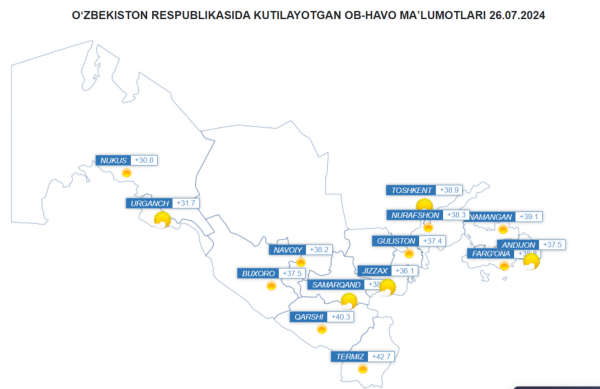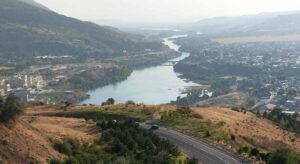On July 26, several regions of Uzbekistan experienced extreme heat, with temperatures soaring above 40 degrees Celsius. By 14:00, the temperature had reached 42.7 degrees in Termiz and 40.3 degrees in Karshi, according to Uzgidromet, the Uzbek State Committee for Hydrometeorology.

The intense heatwave has affected numerous regions across the country. In Namangan, temperatures rose to 39.1 degrees, in Ferghana to 38.8 degrees, in Tashkent to 38.9 degrees, in Samarkand to 38.7 degrees, and in Navoi to 38.2 degrees. The lowest temperatures recorded were in Nukus at 30.8 degrees and in Urganch at 31.7 degrees.
Uzgidromet forecasts indicate that the extreme heat will persist throughout Uzbekistan until July 29. During this period, daytime temperatures are expected to range between 40-43 degrees across most of the country, with southern and desert regions experiencing even higher temperatures of 44-45 degrees.
Earlier predictions from the Research Institute of Hydrometeorology warned of an anomalously hot weather pattern in July and early August. Their analysis highlighted the occurrence of thermal depression, a meteorological phenomenon characterized by the formation of low-pressure areas, dry heat, and hot weather. This condition, common in the southeast of Central Asia, can cause temperatures to rise up to 44-46 degrees and, in some instances, even reach 48 degrees. The duration of a thermal depression can vary from 2-3 days to 5-7 days, and in certain years, it may last up to 1.5-2 weeks.
The Research Institute of Hydrometeorology’s scientists noted that the recent thermal depression has resulted in significant stress on agriculture, various economic sectors, and the energy system in the region. The extreme heat is likely to exacerbate existing challenges in these areas, leading to potential disruptions and economic losses.
Health Advisory
In response to the ongoing heatwave, the Ministry of Health has issued guidelines to help the population cope with the extreme temperatures. The Ministry recommends staying in cool places from 10:00 to 17:00, wearing cotton clothing, and consuming at least 3 liters of liquid daily. Additionally, taking a warm shower during the day and periodically wiping the body with a towel soaked in cold water are suggested measures to prevent overheating.




